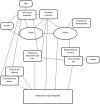Predictors of intentions to quit smoking in Aboriginal tobacco smokers of reproductive age in regional New South Wales (NSW), Australia: quantitative and qualitative findings of a cross-sectional survey
- PMID: 25770232
- PMCID: PMC4360823
- DOI: 10.1136/bmjopen-2014-007020
Predictors of intentions to quit smoking in Aboriginal tobacco smokers of reproductive age in regional New South Wales (NSW), Australia: quantitative and qualitative findings of a cross-sectional survey
Abstract
Objectives: To assess the predictors of intentions to quit smoking in a community sample of Aboriginal smokers of reproductive age, in whom smoking prevalence is slow to decline.
Design, setting and participants: A cross-sectional survey involved 121 Aboriginal smokers, aged 18-45 years from January to May 2014, interviewed at community events on the Mid-North Coast NSW. Qualitative and quantitative data were collected on smoking and quitting attitudes, behaviours and home smoking rules. Perceived efficacy for quitting, and perceived threat from smoking, were uniquely assessed with a validated Risk Behaviour Diagnosis (RBD) Scale.
Main outcome measures: Logistic regression explored the impact of perceived efficacy, perceived threat and consulting previously with a doctor or health professional (HP) on self-reported intentions to quit smoking, controlling for potential confounders, that is, protection responses and fear control responses, home smoking rules, gender and age. Participants' comments regarding smoking and quitting were investigated via inductive analysis, with the assistance of Aboriginal researchers.
Results: Two-thirds of smokers intended to quit within 3 months. Perceived efficacy (OR=4.8; 95% CI 1.78 to 12.93) and consulting previously with a doctor/HP about quitting (OR=3.82; 95% CI 1.43 to 10.2) were significant predictors of intentions to quit. 'Smoking is not doing harm right now' was inversely associated with quit intentions (OR=0.25; 95% CI 0.08 to 0.8). Among those who reported making a quit attempt, after consulting with a doctor/HP, 40% (22/60) rated the professional support received as low (0-2/10). Qualitative themes were: the negatives of smoking (ie, disgust, regret, dependence and stigma), health effects and awareness, quitting, denial, 'smoking helps me cope' and social aspects of smoking.
Conclusions: Perceived efficacy and consulting with a doctor/HP about quitting may be important predictors of intentions to quit smoking in Aboriginal smokers of reproductive age. Professional support was generally perceived to be low; thus, it could be improved for these Aboriginal smokers. Aboriginal participants expressed strong sentiments about smoking and quitting.
Keywords: PREVENTIVE MEDICINE; PUBLIC HEALTH; QUALITATIVE RESEARCH.
Published by the BMJ Publishing Group Limited. For permission to use (where not already granted under a licence) please go to http://group.bmj.com/group/rights-licensing/permissions.
Figures
Similar articles
-
Exploring an adapted Risk Behaviour Diagnosis Scale among Indigenous Australian women who had experiences of smoking during pregnancy: a cross-sectional survey in regional New South Wales, Australia.BMJ Open. 2017 May 30;7(5):e015054. doi: 10.1136/bmjopen-2016-015054. BMJ Open. 2017. PMID: 28566365 Free PMC article.
-
Validation of risk assessment scales and predictors of intentions to quit smoking in Australian Aboriginal and Torres Strait Islander peoples: a cross-sectional survey protocol.BMJ Open. 2014 Jun 5;4(6):e004887. doi: 10.1136/bmjopen-2014-004887. BMJ Open. 2014. PMID: 24902729 Free PMC article.
-
Prospective predictors of quitting behaviours among adult smokers in six cities in China: findings from the International Tobacco Control (ITC) China Survey.Addiction. 2011 Jul;106(7):1335-45. doi: 10.1111/j.1360-0443.2011.03444.x. Epub 2011 May 27. Addiction. 2011. PMID: 21438942 Free PMC article.
-
Predictors of wanting to quit in a national sample of Aboriginal and Torres Strait Islander smokers.Med J Aust. 2015 Jun 1;202(10):S26-32. doi: 10.5694/mja15.00199. Med J Aust. 2015. PMID: 26017252
-
Why do smokers try to quit without medication or counselling? A qualitative study with ex-smokers.BMJ Open. 2015 Apr 30;5(4):e007301. doi: 10.1136/bmjopen-2014-007301. BMJ Open. 2015. PMID: 25933811 Free PMC article. Review.
Cited by
-
Can smoking initiation contexts predict how adult Aboriginal smokers assess their smoking risks? A cross-sectional study using the 'Smoking Risk Assessment Target'.BMJ Open. 2016 Jul 7;6(7):e010722. doi: 10.1136/bmjopen-2015-010722. BMJ Open. 2016. PMID: 27388350 Free PMC article.
-
Intention to Quit Smoking and Associated Factors in Smokers Newly Diagnosed with Pulmonary Tuberculosis.Tanaffos. 2016;15(1):17-24. Tanaffos. 2016. PMID: 27403174 Free PMC article.
-
Improving smoking cessation care in pregnancy at Aboriginal Medical Services: 'ICAN QUIT in Pregnancy' step-wedge cluster randomised study.BMJ Open. 2019 Jun 4;9(6):e025293. doi: 10.1136/bmjopen-2018-025293. BMJ Open. 2019. PMID: 31167863 Free PMC article. Clinical Trial.
-
Psychometric evaluation of a new instrument to hookah tobacco smoking-related factors in the Iranian female university students based on the Extended Parallel Process Model.J Educ Health Promot. 2024 Apr 29;13:138. doi: 10.4103/jehp.jehp_437_23. eCollection 2024. J Educ Health Promot. 2024. PMID: 38784272 Free PMC article.
-
The Indigenous Counselling and Nicotine (ICAN) QUIT in Pregnancy Pilot Study protocol: a feasibility step-wedge cluster randomised trial to improve health providers' management of smoking during pregnancy.BMJ Open. 2017 Aug 4;7(8):e016095. doi: 10.1136/bmjopen-2017-016095. BMJ Open. 2017. PMID: 28780551 Free PMC article. Clinical Trial.
References
-
- Commonwealth of Australia. National Tobacco Strategy 2012–2018—a strategy to improve the health of all Australians by reducing the prevalence of smoking and its associated health, social and economic costs, and the inequalities it causes. Canberra: Commonwealth of Australia, 2012.
-
- Australian Bureau of Statistics. 4727.0.55.006—Australian Aboriginal and Torres Strait Islander Health Survey: Updated Results, 2012–13. Canberra: Australian Bureau of Statistics, 2014. [updated 16 Jul 2014, 11 Oct 2014]. Australian Bureau of Statistics. 4727.0.55.006—Australian Aboriginal and Torres Strait Islander Health Survey: Updated Results.
-
- Australian Institute of Health and Welfare. National Drugs Strategy Household Surveys Canberra: Australian Government; 2013 [cited 19 July 2014]. Available from: http://aihw.gov.au/alcohol-and-other-drugs/ndshs/2013/tobacco/.
Publication types
MeSH terms
LinkOut - more resources
Full Text Sources
Other Literature Sources
Medical
Research Materials
Miscellaneous

